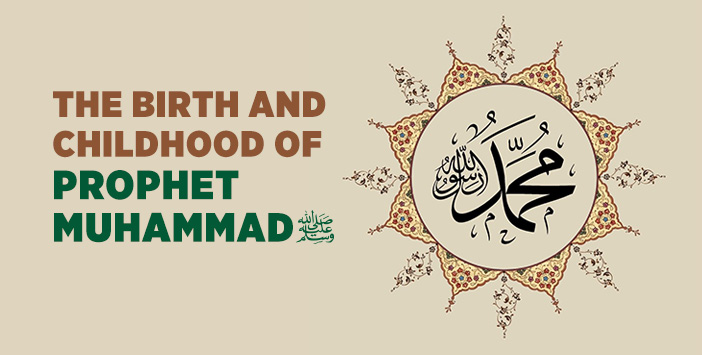The Blessed Prophet -upon him blessings and peace- had already traveled with his uncles in trade caravans to Syria and Yemen as a teenager. How was the business life of the prophet Muhammed (PBUH)…
It should always be borne in mind that being home to the Kaabah, the house of Allah, glory unto Him, Mecca has always been a revered visiting place for believers not only since the time of Ibrahim –upon him peace-, but also since Adam –upon him peace-. Trading with pilgrims by virtue of buying goods from neighboring lands and selling them at fairs during the seasons of pilgrimage, not to mention the selling of local goods to neighboring lands during the regular season, always provided Meccans a major source of livelihood.
The Blessed Prophet -upon him blessings and peace- had already traveled with his uncles in trade caravans to Syria and Yemen as a teenager. In later years, he traveled on another two occasions to Yemen, to the Juraish market, on behalf of Khadijah -Allah be well-pleased with her-, receiving in return a young male camel for each trip.[1] On one occasion, he also took a caravan loaded with goods belonging to Khadijah -Allah be well-pleased with her- to the Hubasha market at Tihamah.
Accompanying him on this trip was Maysara, Khadijah’s -Allah be well-pleased with her- servant. They brought the valued Tihamah fabric they had purchased at the market back to Mecca and sold it to Hakim ibn Hizam with a high profit. The Noble Messenger -upon him blessings and peace- was always very happy with Khadijah’s -Allah be well-pleased with her- conduct when working for her, confessing to have never worked with a better business partner than Khadijah -Allah be well-pleased with her- who more often than not would end up paying Muhammad -upon him blessings and peace- more for his services than the price agreed upon. (Halabî, I, 221, Aynî, X, 104)
It all began with Abu Talib’s advice to Muhammad -upon him blessings and peace-:
“I am a poor man, my dear nephew. Drought has left us with nothing to trade. It has dried up all our capital. But I hear a caravan is about to leave to Damascus and Khadijah -Allah be well-pleased with her-, the daughter of Khuwaylid, is looking for a trustworthy agent to sell some of her goods over there on her behalf; a dependable, loyal person like yourself. I think we should convince her to accept you as a partner in trade. I believe she will prefer you for your trustworthiness. The truth is I do not want you to go to Damascus for the Jews have me fear for your wellbeing, yet I cannot think of another way out.”
The offer made Khadijah -Allah be well-pleased with her- very happy, and she ended up offering Muhammad -upon him blessings and peace- more money than expected, remarking:
“I never knew Muhammad would be willing to work for me!”
Khadijah -Allah be well-pleased with her- knew very well that Muhammad -upon him blessings and peace- was a very reliable and honest man, who possessed an exceptional moral standard.[2]
As Muhammad -upon him blessings and peace- was preparing to leave for Syria, Khadijah -Allah be well-pleased with her- advised her servant Maysara to go with him and obey him under all circumstances.
Having loaded the two camels, they set out. At the outset, the two camels kept lagging behind the rest of the caravan, a reason for concern for Maysara as he felt anxious and rushed to Muhammad -upon him blessings and peace- to inform him of the problem. It only took Muhammad -upon him blessings and peace- to place his hands on the camels’ hooves, immediately after which they rejuvenated, bellowing and marching in a frenzied pace to take the lead in front of the caravan. Witnessing such a sight, the other members of the caravan thereafter showed extra care for Muhammad -upon him blessings and peace- and his servant.[3]
The young Muhammad -upon him blessings and peace- was always honest in his business transactions, fulfilling the promises he made at any cost. Ibn Abbas –Allah be well-pleased with him-, who thoroughly knew the details of Muhammad’s -upon him blessings and peace- life, has said:
“Whenever the Messenger of Allah promised something he would definitely do it.” (Bukhari, Shahâdât, 28)
A similar affirmation was made by Sâib ibn Abi’s-Sâib -Allah be well-pleased with him-, who recounts the time he visited the Blessed Prophet -upon him blessings and peace-, as he was surrounded by the Companions.
“The Companions started praising me to the Messenger of Allah -upon him blessings and peace-, thinking he knew little of me. But he then told the others he knew me more intimately than the rest, upon which I said:
“May my mother and father be ransomed for you, Messenger of Allah; you surely do. You were my business partner; and what an excellent partner you were. Never do I remember you quarrelling nor disputing with me!” (Abû Dâwud, Adab, 17/4836; Ibn Majah, Ticârât, 63)
Countless examples from his life illustrate why the Blessed Prophet was nicknamed al-Amîn (the Trustworthy) and as-Sâdiq (the Honest). One such instant is narrated by Abdullâh ibn Abi’l-Hamsâ –Allah be well-pleased with him:
“I did some trade with the Messenger of Allah –upon him blessings and peace-long before his prophethood. Having owed him money, I told him to wait for me and that I would repay him after a short while. But not long after I departed, I forgot my promise, and came around to remembering it only after three days. On impulse, I rushed back to the spot where I had made the promise and I found him there still waiting for me. Expecting him to pour scold on me, that noble man, who evinced the most remarkable virtues, instead simply remarked, ‘You have placed me in a very difficult situation, young man, keeping me waiting here for the past three days.’’(Abû Dâwûd, Adab, 82/4996)
Such splendid behavior evocative of great wisdom could have only been embodied by a future Prophet.
Had the Almighty wished, He could have enabled His Beloved Prophet to lead a comfortable life, beginning from childhood. But Divine Wisdom willed that he earn his livelihood with his own hands and thus set an example for others to emulate. Confirming the action of the Noble Prophet -upon him blessings and peace- are his words:
“None has ever eaten a better sustenance than that earned by his own hands…” (Bukhari, Buyû’, 15; Enbiyâ, 37)
Any given cause will decrease in value in people’s eyes, if its leader makes a living only through the donations of his followers. Such a leader will no longer be taken seriously by others. This is the gist that underlies the command of the Almighty to His prophets:
“No reward do I ask of you for it: my reward is only from the Lord of the Worlds.” (al-Shuarâ, 109, 127, 145, 164, 180; Yûnus, 72; Hûd, 29)
Echoing this truth also is the following couplet:
Covet not the favor of another,
For its price is the gem of freedom
Since he supported himself through his own earnings, the Blessed Prophet -upon him blessings and peace- was in this sense among the most independent of all people.
Source: Osman Nuri Topbaş, The Prophet Muhammed Mustafa the Elect, Erkam Publications
[1] Hâkim, III, 200/4834.
[2] Ibn Hishâm, I, 203; Ibn Saad, I, 129; Ibn Kathîr, al-Bidâya, II, 297.
[3] Diyarbakrî, I, 262.




